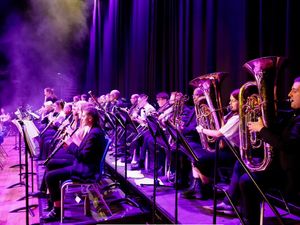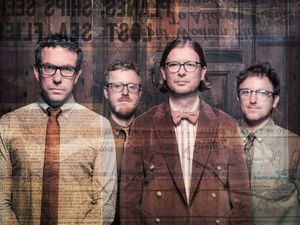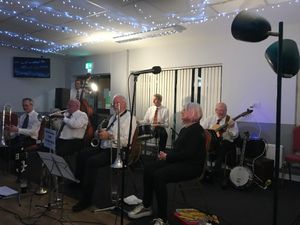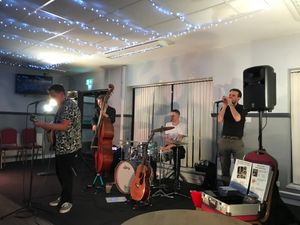'First and foremost, we’ve always seen ourselves as a live band': Simple Minds talk ahead of Birmingham show
They were washed up and cast adrift. Simple Minds had run aground and were destined to go the same was as many of the contemporaries who’d enjoyed success during the 1970s and 1980s.

Their fate was to retire to overseas homes in the sunshine where they could regale friends and associates with stories of former grandeur. At least, that’s the way things were supposed to be.
But they had other ideas. Not content with selling more than 60 million records and making themselves multi-millionaires in the process, not happy with having travelled the world and achieved five UK number one albums, they weren’t ready to lie down.
And so despite a commercial decline that had been painful to watch, despite being dropped unceremoniously by their record label and cast adrift, they decided to roll up their sleeves and get on with it. And while other bands from their era became but a distant memory, Simple Minds began their gradual ascent. They hadn’t yet written all of the songs they needed to write, they weren’t yet done with the adrenalin clusterbomb that is playing to vast arenas and they were more than willing to get their hands dirty and suck up the stresses that are inherent in rock’n’roll in order to achieve their goals.
And so after the fall came their revival. They put their necks on the line, recorded new records, committed to the long, hard slog that is life on the road and ignored the brickbats that came their way. Slowly, that commitment started to pay off.
After the ignominy of seeing a record label refuse to release a record and then having stuttered in the charts at numbers 141, 80 and 37 respectively as the early 2000s were anything but kind, they gradually started to become relevant.
Old fans returned and new ones were found. Rock bands extolled their virtues and cited them as an influence. The wheel of fortune turned full circle and Simple Minds began to enjoy their second ride on rock’s carousel.
Graffiti Soul, released in 2009, saw them re-enter the Top 10, Big Music, released in 2014, was a colossal statement that captured some of the band’s finest new work since their 1980s golden era, the 2016 diversion Acoustic revealed the true quality of songs that were re-imagined and stripped of bombast while last year’s epic Walk Between Worlds – their best album in decades – propelled them back into the top five. Put simply, the band found a creative space in which they became better than they’d ever been. Happy, happy days.
As success came, the wheel turned more quickly. And so now, following the huge acclaim of Walk Between Worlds, they are continuing their recent spectacular renaissance. Last autumn Simple Minds travelled to North America to undertake their first coast to coast tour in over two decades. Taking in 31 cities, both critics and fans unanimously agreed that it was the band’s most successful US tour to date.
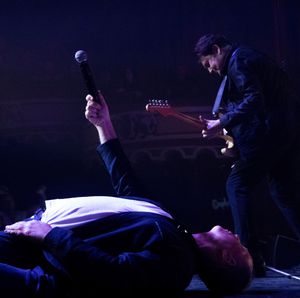
During the last week of the tour, the band decided the shows were so good that they ought to record them. And a live recording of that tour – Simple Minds Live In The City Of Angels – was released at the start of October. And the band will next spring celebrate their 40th anniversary by embarking upon a major world tour. It will return them to the UK’s enormodomes – a gig at Birmingham’s Resorts World Arena will take place on April 24 – and they cannot wait. Actually, they can. And while they are waiting, they’re already recording songs that will appear on the follow-up to Walk Between Worlds.
“Simple Minds are different now,” says singer Jim Kerr. “We’re not a stock rock band, but we haven’t changed our line-up to be cool. We’ve done it because it’s great to have so many amazing players on board. I’m grateful for the career we’ve had, but I’m mad enough to think we can still hit new levels. This is what we do – write, record and play live.”
“The perception that we’re now gathering pace is down to our attitude to playing live,” adds guitarist Charlie Burchill. “There have been lots of different incarnations of Simple Minds, but we’ve always kept our identity. A legacy can be a burden if you allow it to be. For us, it’s been empowering.”
Kerr describes the band’s renaissance as breathtaking. He’s thrilled that the hard work, the refusal to quit and the willingness to be humble and build it all again from scratch is starting to pay off.
“I think in the 1980s, from 1979 to 1989, we did eight albums and toured non-stop as well as starting families. I don’t know how we managed to do it. In the 1990s, we did two albums, one of which the record company refused to release, and the wheels came off. And you know, when the wheels do come off, what are the chances of a rock band getting them back on again? Very slight. The years go past and generations go past.”
Simple Minds made a decision around 12 to 15 years ago to give it one last go. Kerr adds: “We had to either knock it on the head or keep going. We had the understanding that we had to commit everything to it again or let it go. When you’re young, it’s the only thing in your life, it’s no wonder you’re so creative and inspired. But are you going to do that again when you’ve got some money, when you’ve been round the block a few times and being battered?”
Simple Minds decided that they would.
These days, it’s almost as though they have two parallel careers, rather than one. They are continuing to work on new songs while simultaneously curating their own past; reworking and repackaging songs that helped them to make their name. Their Acoustic record of 2016 was a rare moment when those worlds collided. They’d resisted the idea of an acoustic record for more than 20 years because they didn’t think it would be enjoyable or possible.

Kerr says: “We didn’t know how we’d make it work so even we were surprised with the results. You know, as much as I’m always affectionate for those early songs when we were young guys, sometimes I’m even harder on them than critics have been. We didn’t have the skills, or so I thought, to write great songs back then. But Acoustic showed us that I was wrong because those songs really stood up.”
The acclaim with which new work was greeted gave them renewed confidence. And Walk Between Worlds became a masterwork during the autumn of their career. It followed a period of major upheaval. Following an era of relative stability since the early 2000s, only vocalist Jim Kerr, guitarist Charlie Burchill and bassist Ged Grimes remained from the previous studio album, Big Music.
Kerr says refreshing the line-up gave the band new impetus. “Walk Between Worlds came off the back of the new confidence we’d found from doing well. We were trying new things and they were coming off. I have to give credit to the new musicians and new people who came on board, even the guys in the backroom. Everyone played a part and we built up a head of steam.”
And yet despite their studio successes, the millions of records sold and the platinum discs that adorn their studios and homes; Simple Minds have always been first and foremost a live band. And so it’s fitting that as they prepare for their 40th year, the focus is resolutely on live work. Their live album will be adored by fans and their return to vast arenas means they are finally back where they belong.
Kerr is chomping at the bit. He has the enthusiasm and energy of an 18-year-old who still has everything to prove.
“First and foremost, we’ve always seen ourselves as a live band. To be a great live band you need great records and songs. The live thing is what we test ourselves on most. Through the years at different times we’ve felt we ought to capture that but putting out a live album is very much an old school thing these days.
“You know, some people ask if the live album really has the value that it used to have because after you’ve played a concert you can watch it back on YouTube the next morning.
“It was all different when we were coming up. Bootlegs and live records were very rare. So we wanted to go back to that sense of excitement.
“On our last tour, when we played the States, there was magic in the air. We hadn’t been to the States for a long time because the previous tour hadn’t gone well. There was trepidation. We had no idea whether those gigs were going to sell out. But because of the whole absence-makes-the-heart-grow-fonder thing, people went mental.
“The halls we played were perfect, 3,000-seaters, old school style. During the last week of the tour, spontaneously, we decided to get the show down. We didn’t want to film it for video. We just wanted to get it out on record. We know it’s a fan thing, but we wanted to do it. A lot of people didn’t get the chance to see the band on that tour so this will give them to chance to feel and hear it.”
There will be many, of course, for whom a record is not enough. And so next spring the band will play dozens of arenas across Europe.
“Rehearsals start this autumn. We’re doing a lot of music because we have a lot of ground to cover. The fans will hear the songs they expect to hear but there’ll also be a bunch of songs that the hardcore fans will love. It’s been a wee while since we were last in those venues, I would hope we have still progressed.”

Simple Minds’ music became synonymous with pomp and bombast when they were regulars at number one on the charts. And yet away from the stage, Kerr and Burchill are anything but pompous. Quiet and controlled, reflective and humble; they are astounded that their lives have played out in the way that they have.
“I’d like to think we have never been big pompous characters. But we do make big music. Some writers sit on a table under a lightbulb and pour their hearts out and are very worthy, but with Simple Minds the music and the sound were always a big, widescreen thing.
“So it’s great to be looking forward to that. I love the challenge of being on the road and in some ways, I love it more now than I used to. Why? Because it works every single night. The technology then was different and some nights didn’t work. I don’t want to tempt fate and say we never have a bad night, but we never have a bad night. The fans have embraced our songs, they are a part of their lives.
“People might think a show isn’t going to be as good as 1989. But we have to rise to the challenge of making sure they think it’s great. It’s funny, with the younger musicians, we tell them this is a doddle. You haven’t even started a show and people are going mental. The only thing we have to do is be brilliant, every single night, with no exception. That’s what’s at stake. People don’t care if you’re doing 80 shows on tour, they care about that particular night.”
And so the band will be giving it their all.
“My favourite songs are the first and the last. You’ve been waiting all day and it’s time to play, so the first song is always a favourite. Then the last is, because halfway through, you get a great feeling of people being really happy. There’s a great sense of satisfaction. It’s taken months to build up to it and people are happy.
“In our case, we thought our career had gone and then we were getting invites to Australia and Japan and all these unforeseen things. Before we knew it, we’d got the ignition going and were turning the car around to see how far down the road we could take it.”
The future is unwritten. They’re still heading down that road.


